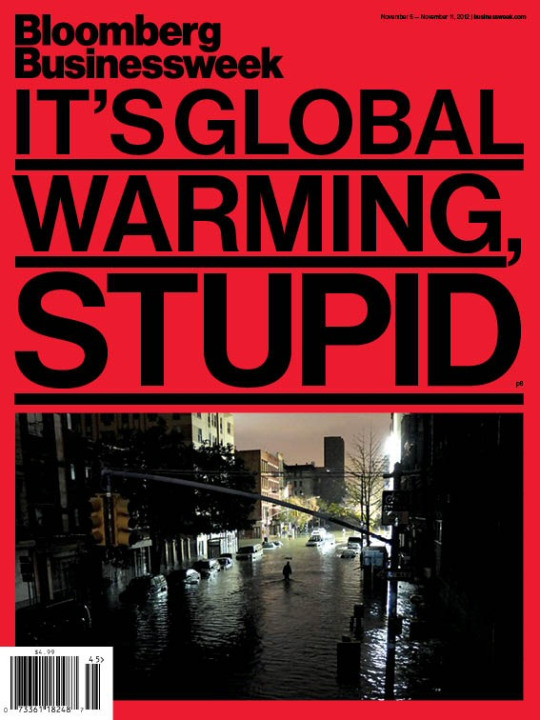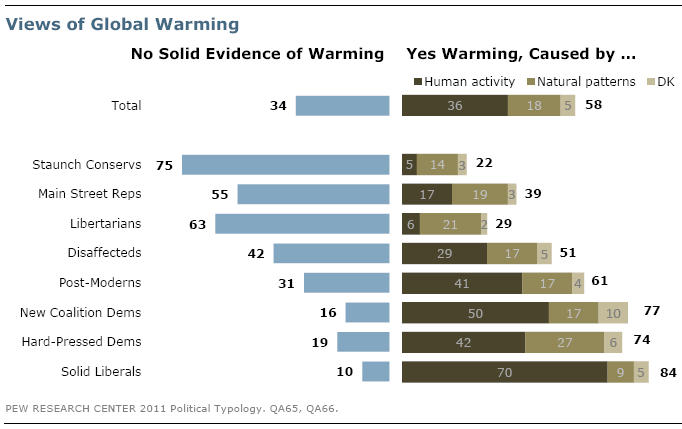Global Warming: Wasn’t That Yesterday’s News Story?
Or is the weather trying to tell us something? Nov 3 2012Glimmerings: In his victory speech, the President said, "We want our children to live in an America that isn't burdened by debt...that isn't threatened by the destructive power of a warming planet". A hint that he intends finally to make good on his 2008 campaign pledge?
Just half a decade ago the debate was whether cap-and-trade or a carbon tax was the better way to go. The media was filled with solar arrays and wind turbines  and how to overcome intermittency. Television showed us research into fossil fuel alternatives such as algae and cellulosic ethanol. Newspapers grappled with how to go about “sequestering” carbon.
and how to overcome intermittency. Television showed us research into fossil fuel alternatives such as algae and cellulosic ethanol. Newspapers grappled with how to go about “sequestering” carbon.
But all has faded from the public conversation. Both Barack Obama and John McCain supported legislation to combat climate change in the 2008 campaign. But by this year, any mention of climate was nowhere to be found in Obama’s State of the Union address. The subject was never raised in any of the three presidential debates.
We have apparently decided not to bother. It is easier to decide that there is no global warming than to do something about it. By two years ago, the percentage of people who believe Earth is warming at all — never mind whether human-caused or not — had dropped from 79% to 59% in a poll by the Pew Research Group. The science is ever more conclusive, but the deniers are winning.
Nature disagrees. As if to bring us to our senses, she has delivered to us a two centuries storm, a behemoth 800 miles across, so deep in the year — the end of October, when one would think that the ocean's heat had been drained off by earlier storms — that the name of this alphabetically-sequenced leviathan began with an "S". Fourteen months earlier, hurricane Irene followed the same path up the Atlantic and wreaked havoc deep into New England. And in between, 2/3rds of the country was scorched with the worst drought in 55 years. In June, 3,215 temperature records were set nationwide, which was nothing compared to the 15,000 that had been set in March. The 12 months ending in June were the warmest continuous 12 months ever recorded. This is not a one year anomaly. The 11 years from 2001-2011 are among the 13 warmest since record-keeping began in 1880, according to the National Oceanic and Atmospheric Administration (NOAA).
Global warming is a calamity that threatens the future of life on the planet. Nevertheless, we have the illogic of its being political. For just how politically polarized, see the chart.
The chart from Pew Research shows just how polarized by political party is the belief in global warming and its causes.
Inescapably, it is a conflict between two mindsets — those who believe in the individual freedom to do as we please in the here and now versus those who are alarmed about the future and want to rein in humanity’s profligacy; those who are predominantly concerned for free markets and the protection of industry from regulation versus those who view that as mindless in the face of natural phenomena that are entirely indifferent to the transitory affairs of mankind.
In the former camp are the fossil fuel industries that have waged a long-term campaign to persuade people that there is no global warming problem. Rex Tillerson, head of ExxonMobil, tells us the future is “manageable”. His company and Koch Industries have long funded the Cato Institute, which has held briefings on global warming with skeptics as panelists and even publishes an energy policy handbook that runs from advocating drilling the Arctic National Wildlife Refuge to eliminating the Department of Energy.
Media outlets such as Fox News and the Wall Street Journal are on the same wavelength, as are Democrats in Congress from coal-producing states, and most Republicans, traditionally allied with the businesses that fund their election campaigns. All profit by preserving the status quo.
It is human nature for them to want to believe the science is wrong in order to be comfortable with their positions, and they have been handed helpful incidents which they have rushed to embrace. First came Michael Mann’s “hockey stick” — a graph that the Penn State physicist and climatologist developed to show temperature progression over the centuries. (The sharp upturn of the temperature line in the past century gives the graph the shape of a hockey stick.) Mann attracted a vitriolic critic, Canadian Stephen McIntyre, who disputed Mann’s use of “proxy” data — the likes of tree-rings, coral, ice cores, etc. — from which climate scientists infer temperature for times or areas where there were no actual temperature measurements. A paper McIntyre wrote won him the sort of space that scientists seldom get — a front page feature in the Wall Street Journal in 2005 — that was just what Republicans were hoping for. Rep. James Sensenbrenner (R-Wi.) called Mann’s work "scientific fascism." Rep. Joe Barton (R-Tx), who considered any action to forestall global warming "absolute nonsense", opened a formal inquiry into the research of climate scientists, Mann among them. Virginia's attorney general, Ken Cuccinelli, subpoenaed Mann's work while he was at the University of Virginia in an attempt to prove that Mann committed "fraud". (His case was recently thrown out of court.)
More than a thousand e-mails among scientists at the Climate Research Unit of the University of East Anglia (CRU) in the U.K., the world's leading research institute on climate change, were leaked in 2009 and skeptics eagerly mined them to expose multiple indiscretions, the biggest of which again involved proxy data. This time, when the CRU group came upon inconvenient 1960s tree-ring data that suggested that temperatures of that period were declining — even as actual temperature readings were rising — they employed what was called the “trick” of substituting the actual readings.
The actuals are, of course, more reliable, but the media treated it as a scandalous cover-up nonetheless. It was "climategate". Opponents leaped at the opportunity to say the science was corrupt and that claims of global warming were a "massive international scientific fraud" (Sensenbrenner again). They had been handed the smoking gun with which to invalidate all global warming.
The public was listening. Remember that public opinion drop from 79% to 59%? That poll was taken five weeks after the climategate story broke.
“Crisis fatigue” — the inability of humans to sustain the continuous level of anxiety that leads to unflagging action — may have played a part in why the public was eager to disbelieve global warming. A better explanation is our avoidist tendency. We eagerly grab onto whatever comes to hand that lets us mentally negate the unpleasant.
As for Mann’s work, a lengthy account of the global warming disputes in Mother Jones magazine tells us that a 2006 assessment from the National Academy of Sciences concluded that while his methodology wasn't perfect, the story his chart told was accurate. But “none of the exonerations mattered: the scientists had lost control of the narrative”.
Those in Congress who wanted to thwart any and all government subsidies to other than fossil fuel industries would see another plum fall in their laps when solar array maker Solyndra collapsed. A bad and costly (at half a billion dollars of government backed loans) bet on an imaginative technology that relied on high prices for the silicon used in rival photovoltaic arrays, the company declared bankruptcy when silicon prices plummeted. The fallout exposed the Obama administration going against the Energy Department’s advice with its politically-driven plan to make Solyndra a paragon of green development.
The public listened again. As with hockey sticks and climategate, the word “Solyndra” became the codeword that congressional Republicans have unfailingly used ever since to characterize as folly all government attempts to develop energy alternatives that could rival fossil fuels.
The result is that the topic of global warming has all but vanished. More accurately, it flares momentarily, as with the summer drought and now with Sandy, and then — much like the anguished cries for gun control when some student slaughters fellow classmates — it subsides at the hands of Americans' attention deficit disorder.
Meanwhile, Nature is letting us know that it has other plans.
Please subscribe if you haven't, or post a comment below about this article, or
click here to go to our front page.

